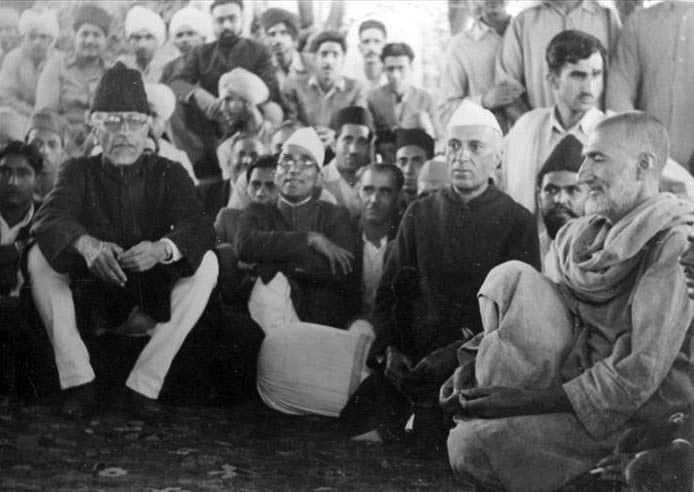
A Muslim Leaguer with known leftist tendencies, Mian Iftikharuddin’s perspective on the resolution that infused religion into matters of the state

Often when talking about the Objectives Resolution of March 1949, my leftist friends exclaim that their stalwart in the Constituent Assembly of Pakistan, Mian Iftikharuddin, opposed the resolution [Mian Iftikharuddin was a Muslim Leaguer, but had known leftist tendencies. There was no representation of the Communist Party or the like in the Constituent Assembly of Pakistan].
After all, how could a left leaning person support a resolution which infused religion into matters of the state? However, a reading of the actual debate on the Objectives Resolution shows something different. While Mian Iftikharuddin was not in the assembly when the Resolution was put to a vote on March 12, 1949 [and hence we cannot know how he would have voted], he did not actually oppose the Resolution when it was tabled, and in fact welcomed it and wanted it to go even further.
Speaking on the Objectives Resolution, Mian Iftikharuddin dismissed the contention of the Pakistan National Congress members that the resolution had a theocratic nature. He noted: "Sir, I assure the members of the Congress Party that the wording of the Preamble does not in any way make this Objectives Resolution any more theocratic, any more religious than the Resolution or the statement of fundamental principles of some of the modern countries of the world."
While technically speaking, he was correct that several constitutions in the world referred to God; however, what was different here was that here the parliament [or more significantly someone else] was supposed to interpret and decipher the will of God, as well as the ‘limits’ put on governance by Him.
Main Iftikharuddin was further bemused by the opposition of the Hindu members of the assembly to the clause that sovereignty belonged to God; he saw nothing special in its recognition. He noted: "As a matter of fact it amused me how the people of our country have hailed this Preamble, this statement of Objectives, as a new discovery. I see that a section of the press, gave it out as if they had scored a journalistic scoop by reporting that the authority is derived from a Higher Power. Sir, the authority, whether we say it or not, is derived from that Power. It does not lie within our power to change the laws of nature or to add to or detract from the Power of Nature’s God. Therefore…we have not done anything extraordinary…"
The only major objection Mian Iftikharuddin had to the wording of the Resolution, was the fact that the state had been mentioned separately from the people. He argued that "the authority descends to the people and not to the state…so why mention the state separately?" He maintained that "we know that the final authority to decide about the limits, the final authority to interpret the rights of the people, is the people themselves."
Insisting that "we must remember that we have no ordained priests…" he exclaimed that "we, the Muslims, can appeal to no other authority on earth than the people." This was certainly a very novel interpretation, since if the people -- and hence their representatives, the parliament, were to be the final deciding authority, then even the members of the Pakistan National Congress would not have had much objection to the Resolution. It was precisely the extra-parliamentary nature of the Resolution which led the members of the opposition to vehemently object to the Resolution.
Mian Iftikharuddin then contended that the Resolution was actually not going far enough. He argued that other states had also used the term ‘Islamic state’ but not achieved justice and fairplay and so the members of the assembly must be careful in their deliberations. He said "…I should have thought that since we were the people who had declared that we were going to give the people real democracy, that we were going to give the people real social justice we were going to show them how the principles of Islamic political ideology would function when put in to practice, we have not done that."
The real issue, he argued, was not going to be between the ‘Hindus’ and ‘Muslims’ but the ‘Hindu have-nots’ and the ‘Muslim have-nots,’ against the Hindu and Muslim upper and middle classes, and therefore legislation should focus on eliminating economic and social disparities. He therefore charged that the Objectives Resolution was not going far enough and said: "Sir, I have a fear that in presenting this Resolution we are not performing that duty as it should have been done. In this Resolution, we do not give any safeguard whereby people would be free to vote, whereby people will not be influenced by their masters under whom they work. Had we brought in such safeguards for them, then only would it be possible for us to give the people of Pakistan a real Islamic democracy and constitution which would have been for the people and of the people."
Mian Iftikharuddin’s conception of the ‘Islamic state’ was certainly very different. He saw in Islam more progressive and revolutionary ideals, which were to offer a better option to the world that the Western model of democracy and also the Communist model.
He said: "The Islamic conception of State is, perhaps, as progressive, as revolutionary, as democratic and as dynamic as that of any other State or ideology." In saying this he was in agreement with both the modernist view of Liaquat Ali Khan and the more conservative Ulema view of Maulana Shabbir Ahmad Osmani; however, the devil remained in the detail -- without a clear extrapolation of what these conceptions meant it left the field wide open to a variety of interpretations each claiming to best represent Islam.